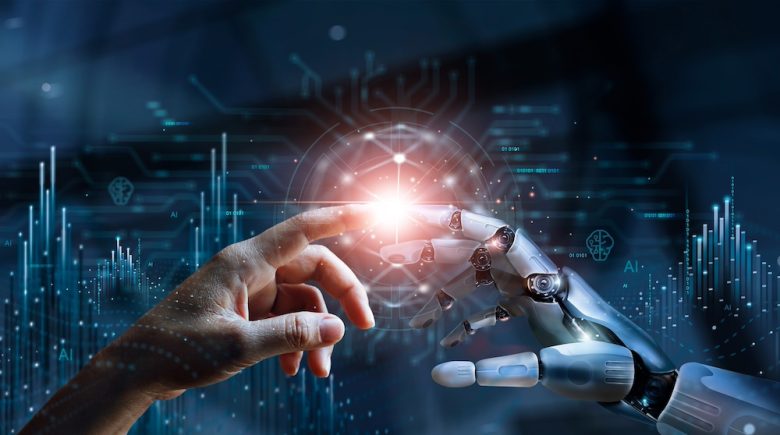Artificial Intelligence (AI) is changing different fields, thus, it causes the new phase of technological developments to begin. This change of focus is very vital to the job market as it will influence employment patterns, job roles and economic structures. AI is growing and its effect on the job market dynamics especially, is becoming more and more important. Here are the ten main effects of AI on job market, which are vital for today’s economic situation.
1. Automation of Routine Tasks
The major effect of AI is the unloading of routine and monotonous jobs. The employment of the people in the field of manufacturing, data entry and basic customer service is more automated these days. To illustrate, AI-supported robots and machines are able to carry out the jobs like assembling goods, packaging items and dealing with logistics better than humans. This tendency is causing the loss of jobs in areas where a lot of handwork and repetition are required.
2. Creation of New Job Categories
AI removes some jobs but at the same time it also generates new ones. The creation, use and running of AI systems is the job for professionals like data scientists, AI specialists, machine learning engineers and AI ethicists. These are the roles that have to be played in order for AI systems to work properly and morally. Besides, new fields and job positions are being created in the sphere of AI technology like those in AI-driven healthcare, finance and autonomous vehicles.
3. Enhancement of Human Capabilities
AI is not only the issue of replacing human jobs, but also it is about the increase in human capabilities. In the spheres of medicine, AI helps physicians to make diagnoses and choose treatments by studying big sets of medical records and research. Equally, in the legal field AI assists lawyers to go through documents and do the research of law much quicker. This feature lets the professionals to concentrate on more intricate and inventive issues of their job, hence they may be happier with it and do the work with a greater efficiency.
4. Change of Skill Requirements
The AI integration in various fields requires a change of the skills that are needed by the workforce. The number of the people that want to have employees with such skills as AI, data analysis and computer programming is increasing. Besides, soft skills like critical thinking, creativity and emotional intelligence are getting more and more important as these are the areas where humans surpass machines. Hence, the urgent task is to set up a system of life-long education and retraining for people so that they can be ready for these new requirements.
5. Job Polarization
AI is affecting the job market and thus, it is one of the factors that leads to job polarization. In this regard high-skill jobs are growing while low-skill ones as well but middle-skill ones are decreasing. Usually, the high-skill jobs mean you need to have a good technical knowledge and they are paid better than low-skill jobs that include tasks not easily automated such as caregiving and some service-oriented roles. The Middle-class jobs, for instance, the ones in administrative and clerical work are more prone to be automated. The polarization may, in turn, result in the growing disparity of incomes if no actions are taken to help those who lose their jobs because of technology.
6. Changes in Work Environment
AI is the one more thing that changes the work environment, by making it possible to have flexible and remote working arrangements. The AI-based instruments enable the teamwork from different locations, remote collaboration, project management and communication thus making it easier for teams to work together. The flexibility can assist in the balance of work and life thus; it increases job satisfaction. Nevertheless, it is also accompanied by problems like the security of data and team solidarity in a virtual environment.
7. Impact on Wages and Employment
The massive implementation of AI can change the wages and employment levels in various ways. In some areas, AI can be the reason for job loss and decrease of wages for routine tasks. On the contrary, in areas where AI enhances human skills, it results in a higher demand for skilled workers and hence their wages go up. The net result on wages and employment will be the function of job creation versus displacement, as well as the capability of workforce to adjust to new roles and technologies.
8. Ethical and Regulatory Considerations
The AI integration into the job market is accompanied by big ethical and regulatory issues. Problems like data privacy, algorithmic bias and the ethical use of AI in decision-making are very important. Governments and organizations should lay down the rules to tackle these problems and see that AI is used correctly. Besides, the AI systems should be open and accountable to keep the public confidence and from being used in a wrong way.
9. Global Job Market Disparities
The job market is not affected by AI in the same way all over the world. The developed countries with the modern technological infrastructure have a better chance of taking up the advantages that AI can give them and thus enlarging even more they gap between them and developing countries. In the underdeveloped countries, AI technology and the skills to use it are not available which in turn worsens the already existing economic disparities. International collaboration and investment in education and infrastructure are the two things that must be done to make sure the benefits of AI will be more equally distributed.
10. Long-Term Economic Transformation
AI can possibly be the driving force of economic revolution in the long run. It can raise the productivity, provoke the innovation and create completely new markets and industries. Nevertheless, this process will have to be controlled properly so that the negative effects on employment are eliminated and economic gains are distributed equally. The authorities, companies and the education system have to cooperate in order to make a sustainable and all-inclusive future where AI will be of use for everyone.
Conclusion
AI is the main cause of job market changes and its effect on it is very deep and wide. Although AI is capable of boosting the economic growth and innovation, it also brings some problems that have to be solved so as to guarantee a just and equitable transformation. Through the attention to reskilling of the workforce, creation of new jobs and introduction of ethical and regulatory frameworks society can obtain AI advantages while minimizing its risks. The upcoming working environment will be determined by how we manage the challenges of this technological revolution.
Artificial Intelligence (AI) is changing different fields, thus, it causes the new phase of technological developments to begin. This change of focus is very vital to the job market as it will influence employment patterns, job roles and economic structures. AI is growing and its effect on the job market dynamics especially, is becoming more and more important. Here are the ten main effects of AI on job market, which are vital for today’s economic situation.
1. Automation of Routine Tasks
The major effect of AI is the unloading of routine and monotonous jobs. The employment of the people in the field of manufacturing, data entry and basic customer service is more automated these days. To illustrate, AI-supported robots and machines are able to carry out the jobs like assembling goods, packaging items and dealing with logistics better than humans. This tendency is causing the loss of jobs in areas where a lot of handwork and repetition are required.
2. Creation of New Job Categories
AI removes some jobs but at the same time it also generates new ones. The creation, use and running of AI systems is the job for professionals like data scientists, AI specialists, machine learning engineers and AI ethicists. These are the roles that have to be played in order for AI systems to work properly and morally. Besides, new fields and job positions are being created in the sphere of AI technology like those in AI-driven healthcare, finance and autonomous vehicles.
3. Enhancement of Human Capabilities
AI is not only the issue of replacing human jobs, but also it is about the increase in human capabilities. In the spheres of medicine, AI helps physicians to make diagnoses and choose treatments by studying big sets of medical records and research. Equally, in the legal field AI assists lawyers to go through documents and do the research of law much quicker. This feature lets the professionals to concentrate on more intricate and inventive issues of their job, hence they may be happier with it and do the work with a greater efficiency.
4. Change of Skill Requirements
The AI integration in various fields requires a change of the skills that are needed by the workforce. The number of the people that want to have employees with such skills as AI, data analysis and computer programming is increasing. Besides, soft skills like critical thinking, creativity and emotional intelligence are getting more and more important as these are the areas where humans surpass machines. Hence, the urgent task is to set up a system of life-long education and retraining for people so that they can be ready for these new requirements.
5. Job Polarization
AI is affecting the job market and thus, it is one of the factors that leads to job polarization. In this regard high-skill jobs are growing while low-skill ones as well but middle-skill ones are decreasing. Usually, the high-skill jobs mean you need to have a good technical knowledge and they are paid better than low-skill jobs that include tasks not easily automated such as caregiving and some service-oriented roles. The Middle-class jobs, for instance, the ones in administrative and clerical work are more prone to be automated. The polarization may, in turn, result in the growing disparity of incomes if no actions are taken to help those who lose their jobs because of technology.
6. Changes in Work Environment
AI is the one more thing that changes the work environment, by making it possible to have flexible and remote working arrangements. The AI-based instruments enable the teamwork from different locations, remote collaboration, project management and communication thus making it easier for teams to work together. The flexibility can assist in the balance of work and life thus; it increases job satisfaction. Nevertheless, it is also accompanied by problems like the security of data and team solidarity in a virtual environment.
7. Impact on Wages and Employment
The massive implementation of AI can change the wages and employment levels in various ways. In some areas, AI can be the reason for job loss and decrease of wages for routine tasks. On the contrary, in areas where AI enhances human skills, it results in a higher demand for skilled workers and hence their wages go up. The net result on wages and employment will be the function of job creation versus displacement, as well as the capability of workforce to adjust to new roles and technologies.
8. Ethical and Regulatory Considerations
The AI integration into the job market is accompanied by big ethical and regulatory issues. Problems like data privacy, algorithmic bias and the ethical use of AI in decision-making are very important. Governments and organizations should lay down the rules to tackle these problems and see that AI is used correctly. Besides, the AI systems should be open and accountable to keep the public confidence and from being used in a wrong way.
9. Global Job Market Disparities
The job market is not affected by AI in the same way all over the world. The developed countries with the modern technological infrastructure have a better chance of taking up the advantages that AI can give them and thus enlarging even more they gap between them and developing countries. In the underdeveloped countries, AI technology and the skills to use it are not available which in turn worsens the already existing economic disparities. International collaboration and investment in education and infrastructure are the two things that must be done to make sure the benefits of AI will be more equally distributed.
10. Long-Term Economic Transformation
AI can possibly be the driving force of economic revolution in the long run. It can raise the productivity, provoke the innovation and create completely new markets and industries. Nevertheless, this process will have to be controlled properly so that the negative effects on employment are eliminated and economic gains are distributed equally. The authorities, companies and the education system have to cooperate in order to make a sustainable and all-inclusive future where AI will be of use for everyone.
Conclusion
AI is the main cause of job market changes and its effect on it is very deep and wide. Although AI is capable of boosting the economic growth and innovation, it also brings some problems that have to be solved so as to guarantee a just and equitable transformation. Through the attention to reskilling of the workforce, creation of new jobs and introduction of ethical and regulatory frameworks society can obtain AI advantages while minimizing its risks. The upcoming working environment will be determined by how we manage the challenges of this technological revolution.






